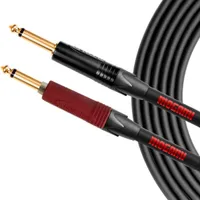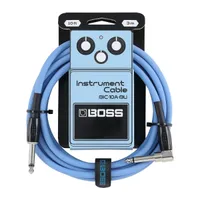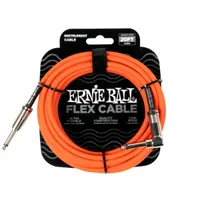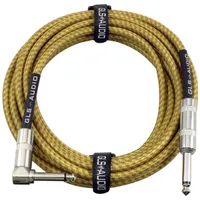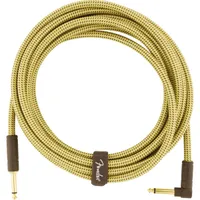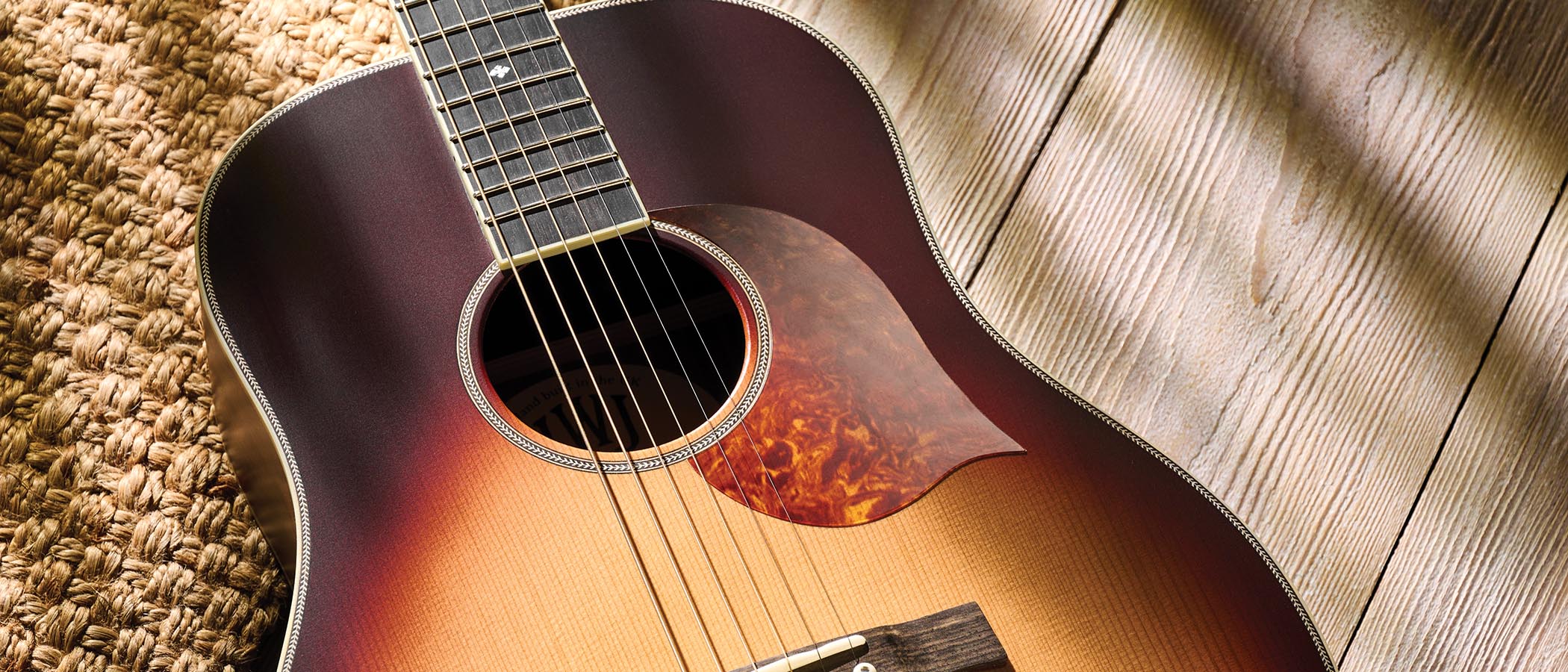What's the best guitar cable in 2026? These are the tried & tested options I'd recommend to any player
There's a lot of snake oil when it comes to the top guitar cables – I'm a professional guitar gear reviewer and I've tested 11 of the best to help you find your perfect match
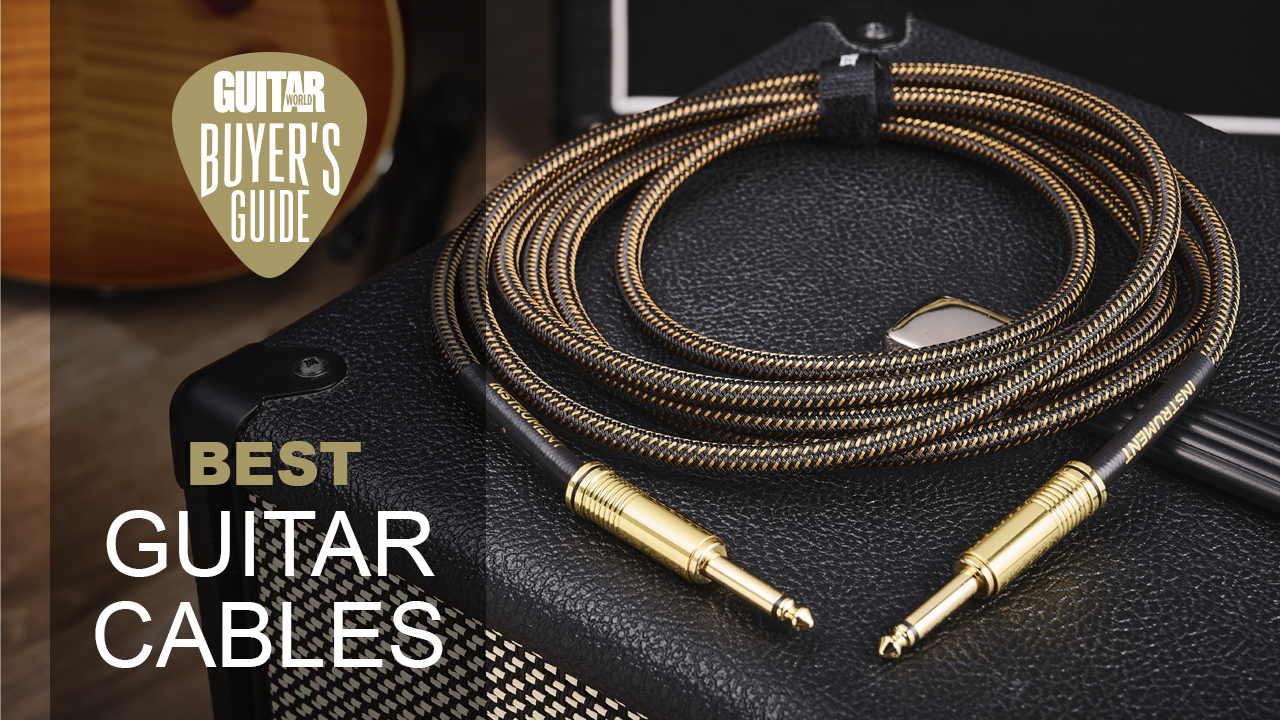
All the latest guitar news, interviews, lessons, reviews, deals and more, direct to your inbox!
You are now subscribed
Your newsletter sign-up was successful
With modern guitar players paying more and more attention to their signal chains, every component is now under scrutiny in the search for great guitar tone. Something that was previously seen as throwaway, like a cable, is now the subject of all kinds of perlustration. The truth is, with the best guitar cables, you’re unlikely to hear a major difference between any two brands unless it’s under a microscope in a professional recording studio.
So what’s the point of a guide to the top-rated guitar cables then? Well, there are plenty of other factors that will determine the best cable for your particular use case, whether that’s the most important factor, like the build quality, or more personal facets such as the connector types, colors, and length options.
I’ve been a guitarist for over twenty years now, and in that time, I’ve used and abused more than my fair share of guitar cables. I’ve had plenty break on me, some at very inopportune moments, so I’m a big believer that build quality is the single defining factor of what makes a great cable. To that end, I tested every single cable in this guide, taking it apart to look at the craftsmanship, as well as pulling, stomping, throwing, and bending each one to the extreme to see how well they held up.
In my tests, I could find no cable better than the Mogami Gold. The build quality is fantastic, and Mogami cable is used in many professional audio capacities across the world. They aren’t cheap though, so if you want something ultra-durable that doesn’t cost a bomb, go check out the Boss BIC-5 Instrument Cable for quality on a budget.

"I've been regularly gigging, writing, and recording for the last 20 years, using and abusing countless guitar cables along the way. I spend a lot of time testing and reviewing music gear for Guitar World, whether that's guitars, amps, pedals, modelers, or pretty much anything else related to guitar. Of course, I need instrument cables for all of the above, so I know what to look for when picking out a cable that will last."
My top picks
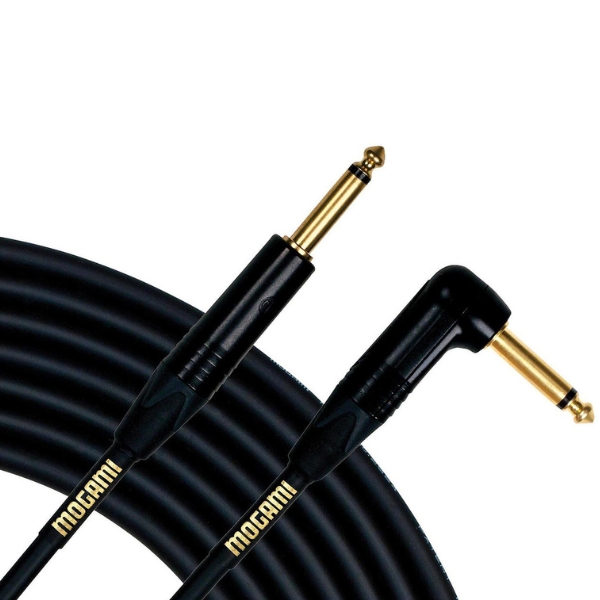
The Mogami Gold guitar cable is for me, the best of the best. It’s not a cheap cable by any stretch, but if you want the utmost in quality and are willing to pay for it, then it doesn’t come much better than this.
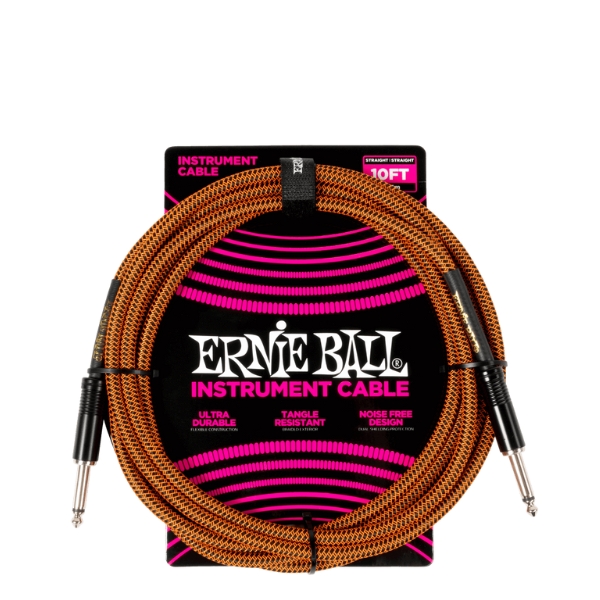
If you want your guitar cable with a bit more personality, the Ernie Ball Braided Cable gives you loads of options. Coming in 31 color and length variations, it’s offers the most choice from a modern guitar cable, and it’s great value for money too.
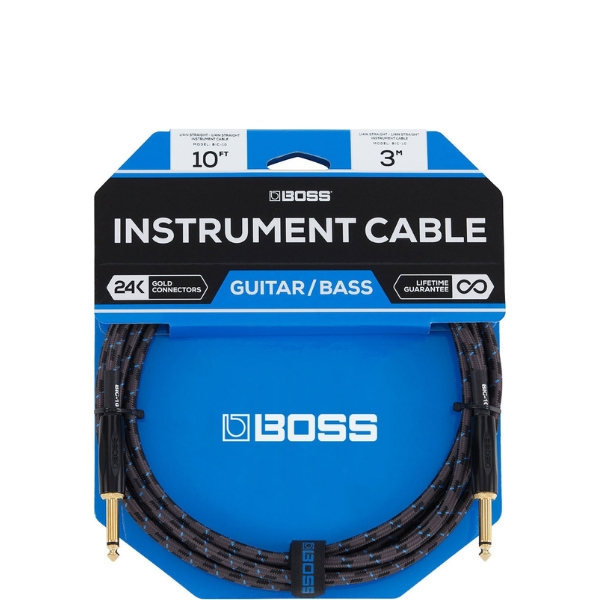
If you want a rock-solid guitar cable that will do the business but doesn’t cost the equivalent of a decent overdrive pedal, definitely check out the Boss Instrument Cable. It’s robust, made with great quality components, and is cost-accessible for most guitar players.
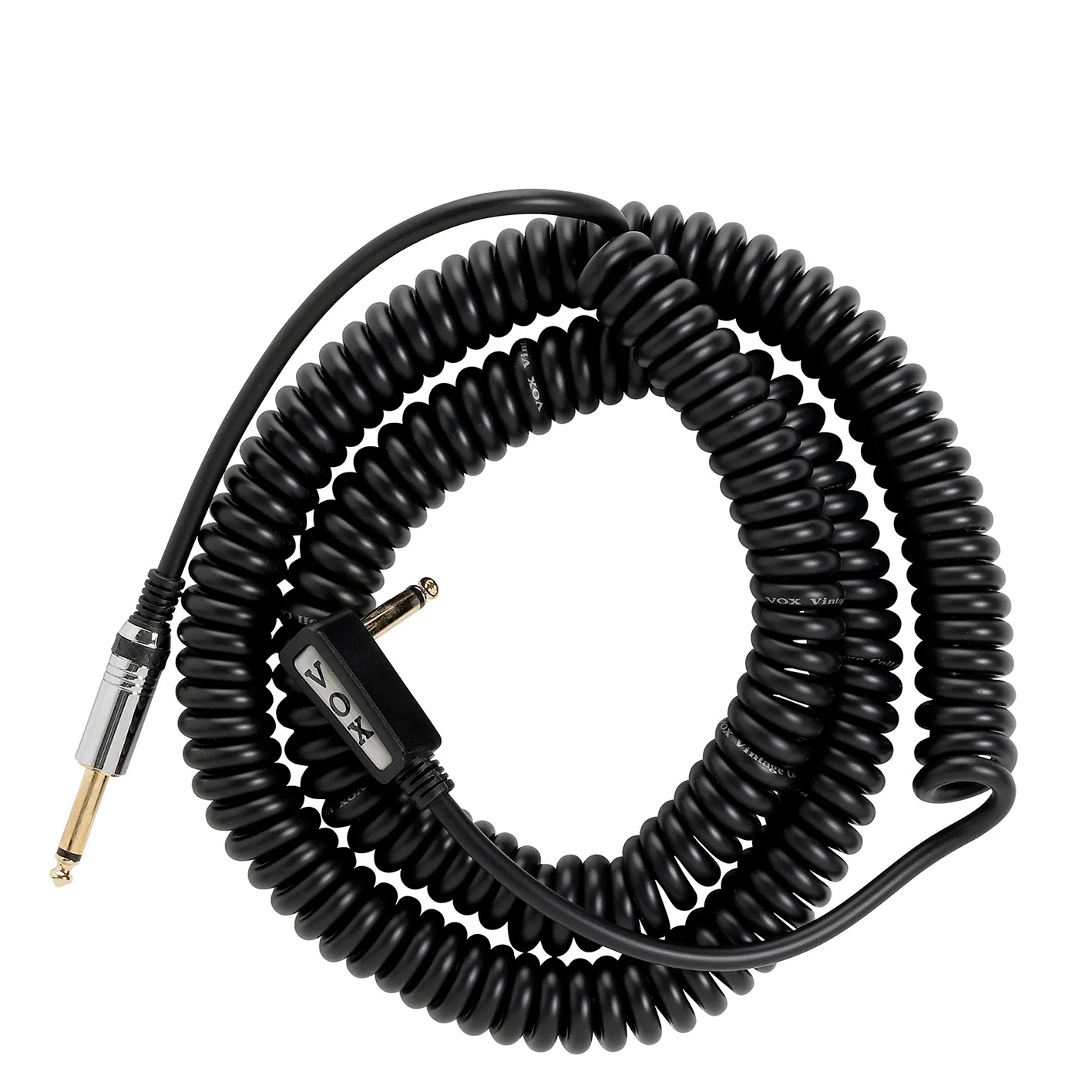
This cable is really well made and guitarists will love the way it springs back up, which stops it getting in your way on stage, while others just like the vintage aesthetic the coiled cable implies, particularly its association with Jimi Hendrix.
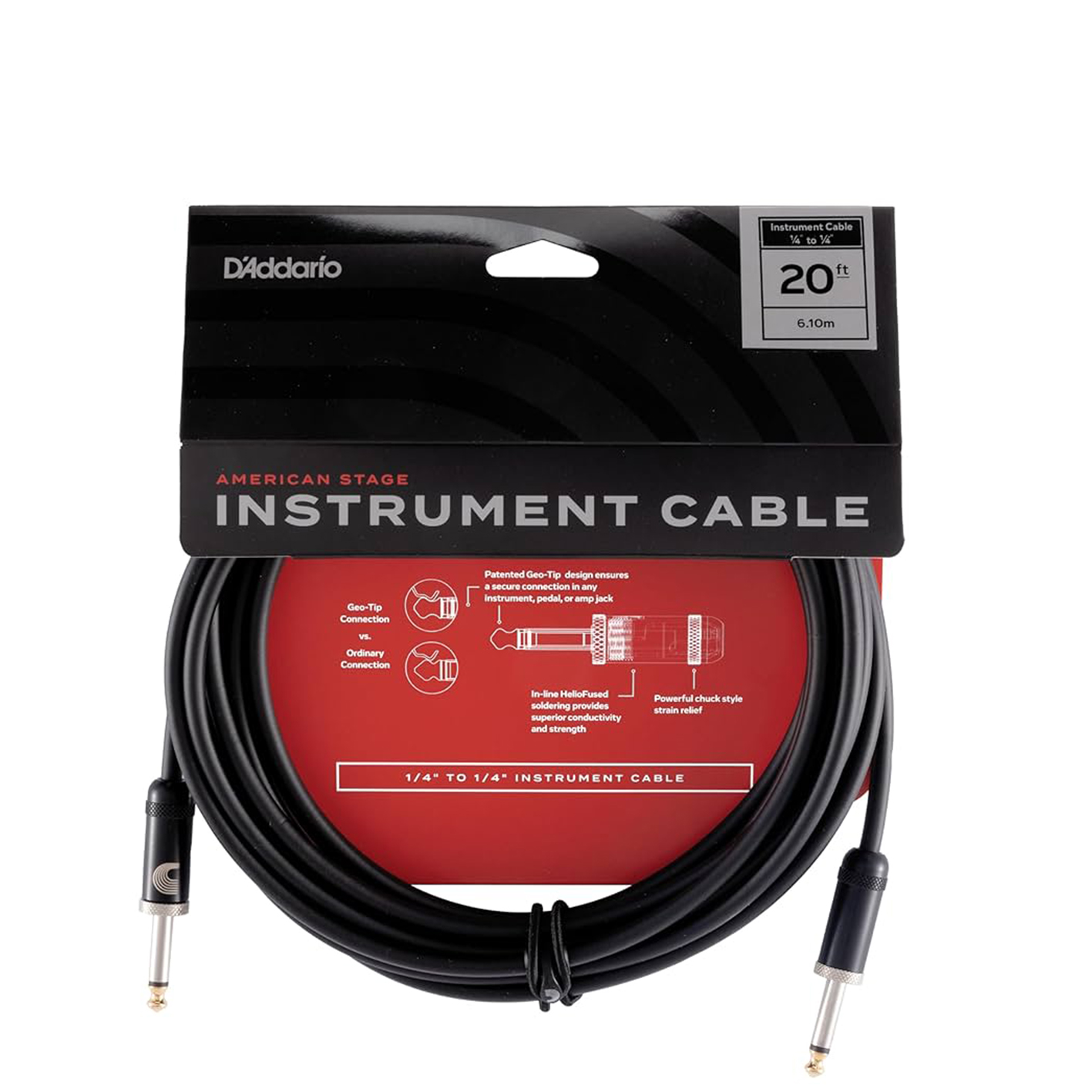
This cable instantly makes its best use case clear in its name. With a super durable build and one of the strongest solder joints around, it’s a cable designed for the rough and tumble of going on tour.
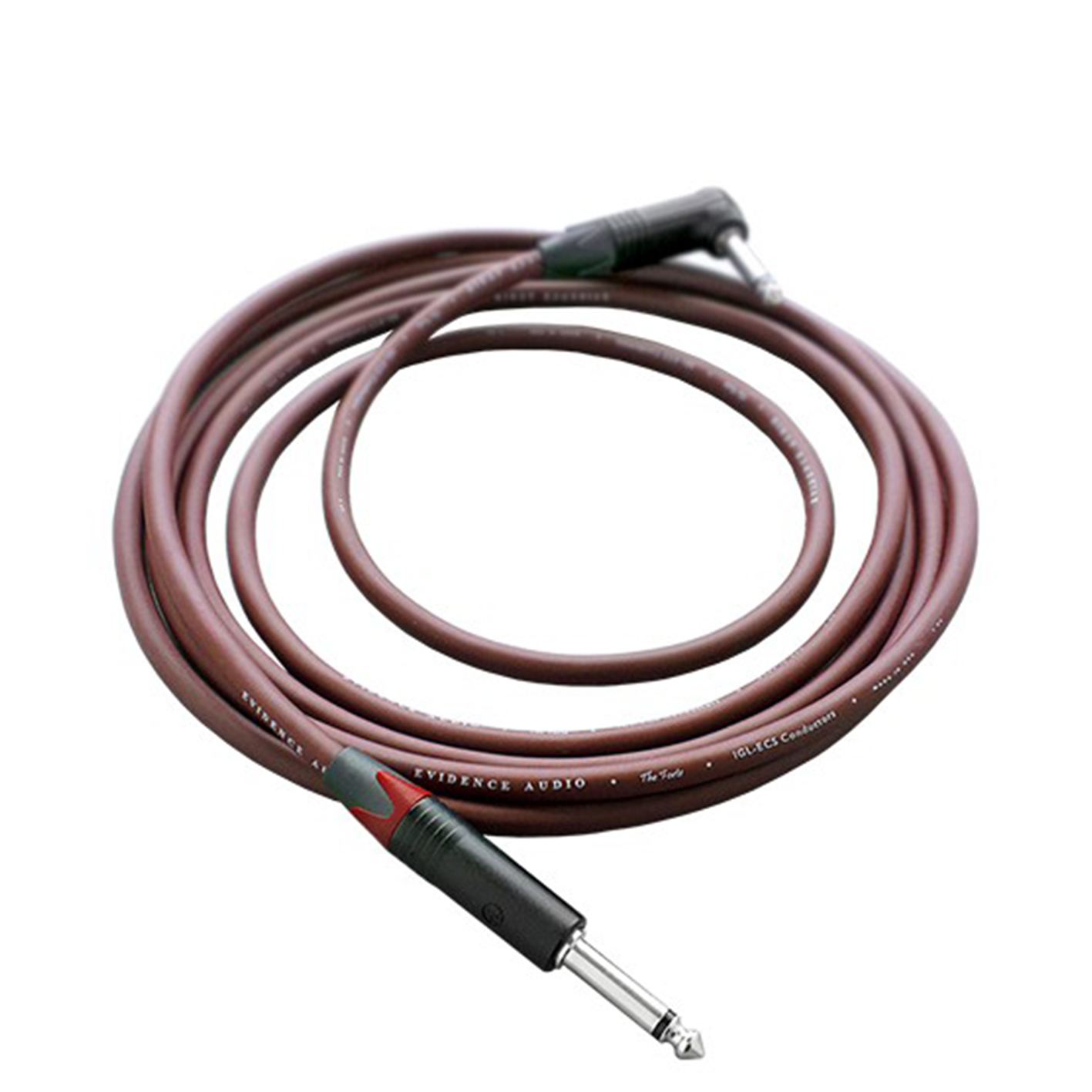
If you’re looking for a durable guitar cable that can be spec’d to your specific needs, the Evidence Audio Forte is an awesome option for guitar players. They’re not cheap, but you’re getting a handmade cable with the utmost quality components and a design that prioritizes quality.
Best overall
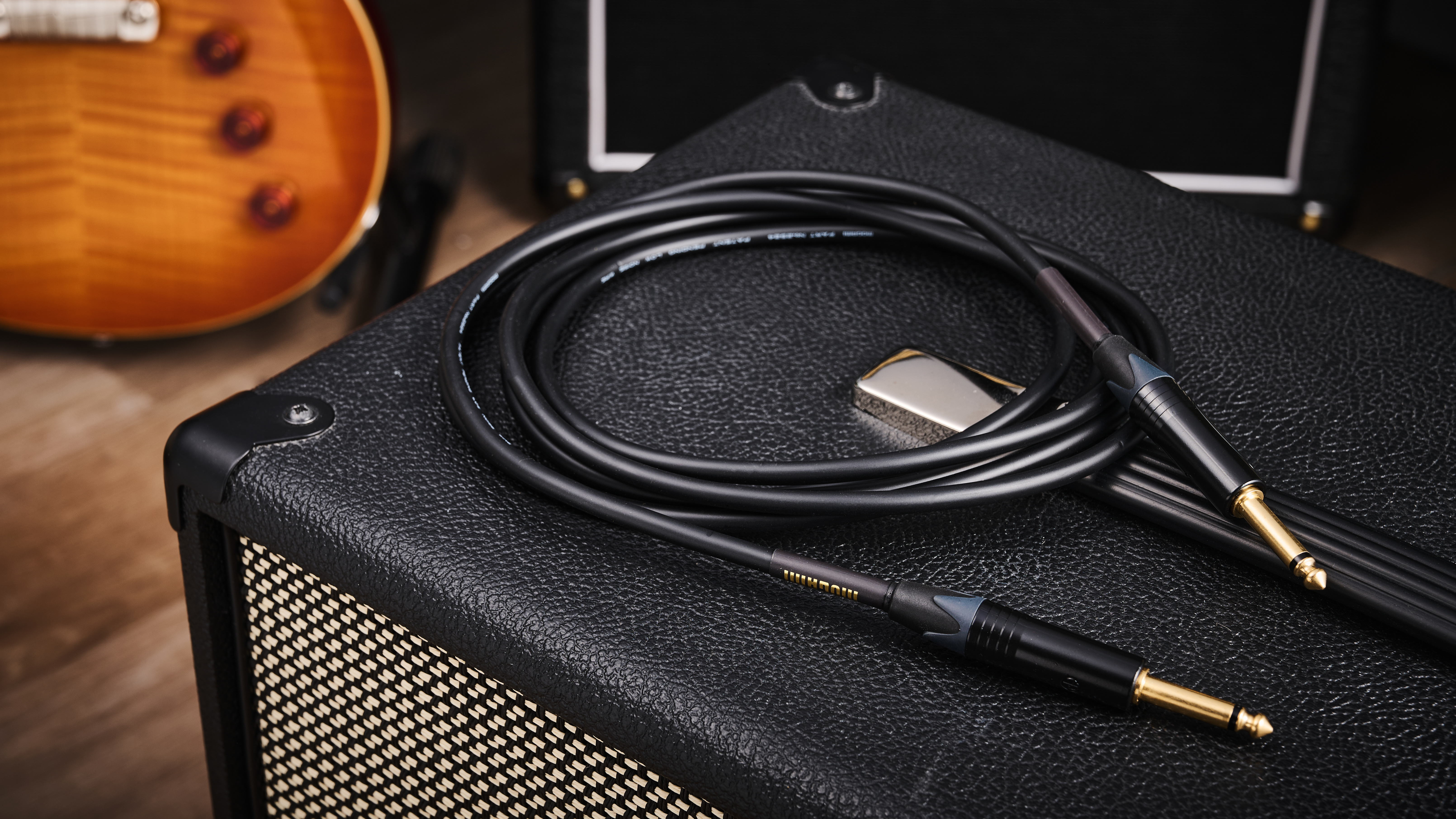
1. Mogami Gold
Our expert review:
Specifications
Reasons to buy
Reasons to avoid
🔌 The Mogami Gold Guitar Cable is for the guitarist who wants the best quality everything. It's not cheap, but it will stand the test of time and sound great whilst doing so.
✅ Buy if you want the best quality guitar cable: With its robust Neutrik connectors and Carbon-impregnated PVC jacket, this is a cable that will last a lifetime.
❌ Avoid if you're on a budget: It's not the cheapest option here, so if you're looking to spend small then there are other, cheaper cables in this guide.
Overview: Quite literally the gold standard for cabling in the audio world, Mogami cables are used in professional audio installations and more studios than I’ve got time to name here. The Mogami Gold is hugely popular for guitarists, and although it’s a pricey proposition, that lifetime warranty makes it a very worthwhile investment.
Options: Another plus point for the Mogami Gold is the good amount of options you get in terms of length and jack combination. You can get both ends straight or one straight and one right-angled. There are also lengths available in 3, 6, 10, 18, and 25-foot, so whether you’re playing live or just need something to plug into at home, you’ve got plenty of options.
Build quality: Where the Mogami really stands out for me in terms of build quality are those Neutrik connectors. They feel really hefty and solid, and they’re very satisfying to plug into a jack input or output. I’ve always found over the years that Neutrik connectors are incredibly reliable, and they just feel better made than other, no-name ones I tried during the test.
The connectors unscrew slightly differently to most guitar cables, with them coming apart at the bottom near the cable end rather than the top near the jack side of the cable. Pulling the connector apart and removing the additional plastic sheath I found a very well soldered connection that was nice and shiny.
There are multiple layers of PVC sheathing too that make the join very strong, so when you try and bend it the cable naturally wants to move further down and away from the more delicate portion of the cable where it’s soldered. It’s a great design, and I can totally see why Mogami cables last as long as they do, because it’s clear a lot of thought has gone into how the connectors will be stressed over years of use.
The cable itself is not as thick as some of the others I tested, but that does allow it to flex quite nicely, which could be useful depending on how you’re using it. There’s also an additional sheath near the connector side that prevents it from flexing too much near the plug, but it does allow for a more severe bend should additional pressure be put on it, which should prevent any breakage in the event someone accidentally puts too much pressure on the plug itself.
Verdict: Overall, it’s one of the most robust feeling cables I tested, and it’s easy to see why it’s so highly rated amongst the audio community. It has the same high-quality feel as the similarly expensive Evidence Audio cable that was part of my group test, and I like that the cable is a little thinner so is able to flex more, which makes it a little more versatile versus some of the other more premium offerings that have a thicker gauge.
Test | Results | Score |
|---|---|---|
Options | Enough to cater for most guitarists | ★★★★★ |
Build quality | The most robust cable of all I tested | ★★★★★ |
Connector | Incredibly robust Neutrik connector that's easy to repair | ★★★★★ |
Flexibility | Right in the middle of flexible and rigid | ★★★★★ |
Overall | The gold standard for guitar cables | ★★★★★ |
Best for options
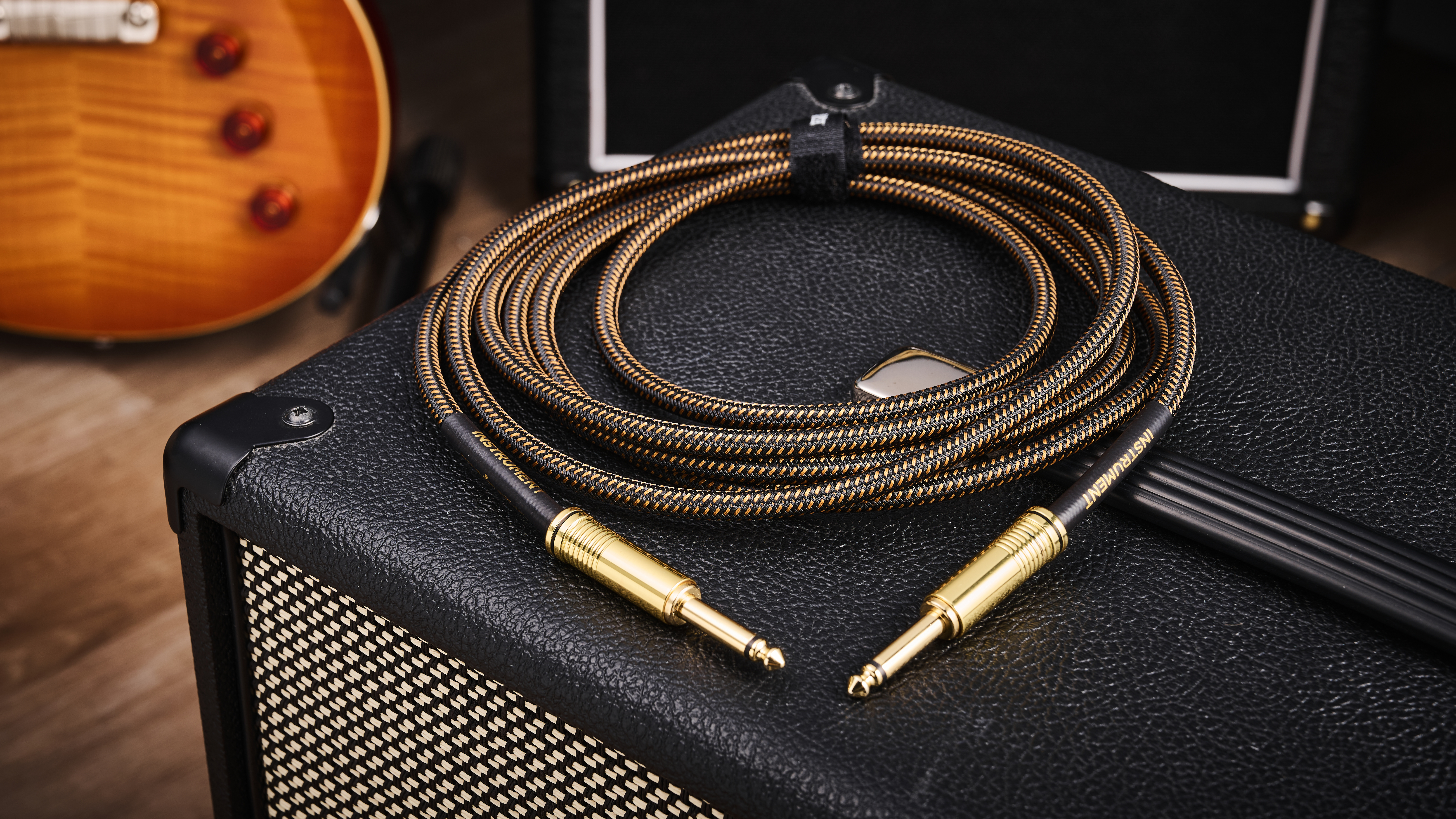
2. Ernie Ball Braided
Our expert review:
Specifications
Reasons to buy
Reasons to avoid
🔌 The Ernie Ball Braided Guitar Cable is for the guitarist who wants all their gear to match. Available in a huge array of colors, this durably built cable is probably as good looking as guitar cables get.
✅ Buy if you want lots of options: With a huge amount of lengths available and a full 12 different colors, this is the perfect cable if you want a particular look to your rig.
❌ Avoid if you like your cables to flex: Due to the braided jacket, you'll find this cable isn't quite as flexible as some of the PVC-coated options here.
Overview: The Ernie Ball Braided Cable also has a huge selection of colors available, which makes it my top choice if you want to inject a bit of personality into your cable use. After all, why would you have a boring black cable when you can match your guitar and strap colors for some extra cool factor on stage?
Options: I counted them on the Ernie Ball website, and there are 31 different options available if you include all the colors and the three options for length. That’s a serious amount of choice versus the other cables in this list, which generally only have one color option available. You also get the option of a straight-to-straight or straight-to-right-angle cable too.
Build quality: Braided cables are a good choice for a couple of reasons. The braided jacket offers extra protection to the cable inside, and it also helps with the cable tangling, provided you take care to wrap it up properly each time you’re done. Braided cables can be divisive though, as they don’t tend to flex as much as non-braided cables, and also have a tendency to hold their shape if they’ve been wrapped up for a long time.
The braiding on the Ernie Ball cable feels quite rough compared to that on the Boss Instrument Cable, but it's perfectly applied and adds a feeling of robustness to it. The cable flexes relatively easily too, so you’ll be able to bend it around corners and thread it through things with ease.
The connectors are gold-plated all over on the cable that I tested, but this does differ depending on which colorway you go for. It’s not quite as robust feeling as the Neutrik connectors on some of the other cables, but I certainly don’t have any qualms about their ability to stand up to repeated use over time.
Unscrewing the connector to look inside, I found the whole point of connection obscured by a PVC sheath. This is no doubt useful for protecting the join, but if something were to go wrong with the connector, it would be a pain to cut off. The whole portion of PVC near the connector also makes it very stiff, so with the additional protection of the metal connector jacket, I can’t see any issues occurring with flexing near the solder joints.
The PVC sheathing runs further down beyond the connector, allowing the cable to flex some here, but not as much as it does further down onto the braided portion of it. Again, this is good design as you don’t want something so robust it’ll snap under huge pressure, you want a cable to be able to move a bit as it’s naturally going to happen as you plug it in and out over its lifetime.
Verdict: The Ernie Ball Braided Cable is my top pick if you want something different from your regular, boring black guitar cable. The options on offer here are humongous, and the cables are also excellent value for money. They’re not as durable feeling as the pricier options on this list, but they still feel robust enough to hold up to regular use. Add in a limited lifetime warranty, and you’ve got a great cable for relatively little money.
Test | Results | Score |
|---|---|---|
Options | Loads of great color and length options | ★★★★★ |
Build quality | Very robust thanks to braided jacket | ★★★★½ |
Connector | EB own brand connector that's easy to unscrew | ★★★★½ |
Flexibility | Not as flexible as others here | ★★★★☆ |
Overall | Great if you want colors other than black | ★★★★½ |
Best value for money
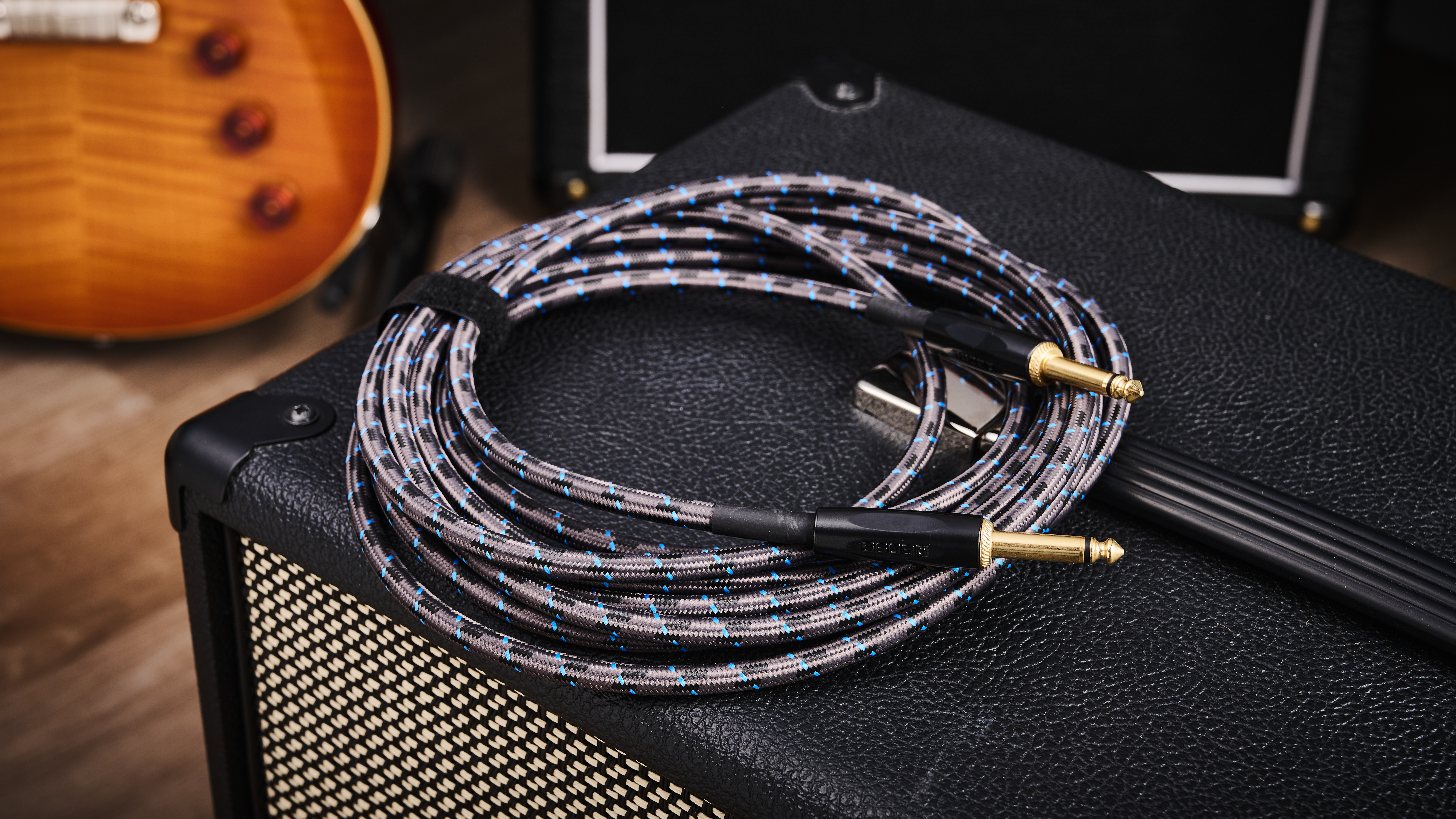
3. Boss Instrument Cable
Our expert review:
Specifications
Reasons to buy
Reasons to avoid
🔌 The Boss Instrument Cable is for the everyday guitarist who wants a reliable connection that doesn't cost the earth. Coming with a lifetime warranty, this is an excellent quality cable for not a lot of money.
✅ Buy if you don't want to spend loads: With its excellent value price, this is a great cable for the guitarist who doesn't want to spend a ton of money.
❌ Avoid if you need angled jacks: Unfortunately it only comes in a straight-to-straight configuration, so look elsewhere if you want a right-angle jack.
Overview: The Boss BIC-5 Instrument Cable is a great value option that’s similar in price to the Ernie Ball Braided cable. Like the Mogami Gold cables, they also feature a lifetime warranty, which makes them outstanding value for money in my book.
Options: It’s not available in the myriad options available from the EB cable, but it does have four length options, which gives it a plus one in the options box. The BIC-5 is only available in a straight-to-straight configuration however, so you’ll need to spend more on a BIC-10 to get a right-angled connector.
Build quality: The BIC-5 is the second braided cable I tried for this group test, and where the Ernie Ball goes for a rough texture, the Boss offering is a decidedly smoother affair. It doesn’t feel any less robust though, and offers an extra layer of protection that means it will put up with getting chucked around and stomped on.
Again, it’s similar in gauge to the Ernie Ball cable, but I found the Boss flexed a little easier, feeling overall less stiff than most of the other cables. This might be a plus or minus depending on your use case, but I tend to prefer a bit of flex in my cables for better handling.
The connectors are 24k gold-plated and custom-made by Boss, sharing an aesthetic that’s very much like the jackets on the Neutrik-equipped cables. Unscrewing the sheath reveals more similarities with the Ernie Ball cable, as it features a plastic covering that runs all the way up to the solder join. This creates a very stiff portion of cable that when covered by the metal jacket, ensures that no pressure is applied to the delicate portion of it.
Verdict: If you want a good quality cable that doesn’t cost all that much, the Boss BIC-5 is a great choice. I like the durability of a braided cable and, coupled with good quality connectors, have little doubt that this cable will stand the test of time. It might not have the most options available, but if you don’t want to spend loads, it’s one of the best.
Test | Results | Score |
|---|---|---|
Options | One color and no right angle jack | ★★★★☆ |
Build quality | Braided jacket makes it hardwearing | ★★★★½ |
Connector | 24k gold plated and screwable for repairs | ★★★★½ |
Flexibility | Flexes nicely for a braided cable | ★★★★½ |
Overall | An excellent value option for the unfussy guitarist | ★★★★½ |
Best coiled cable
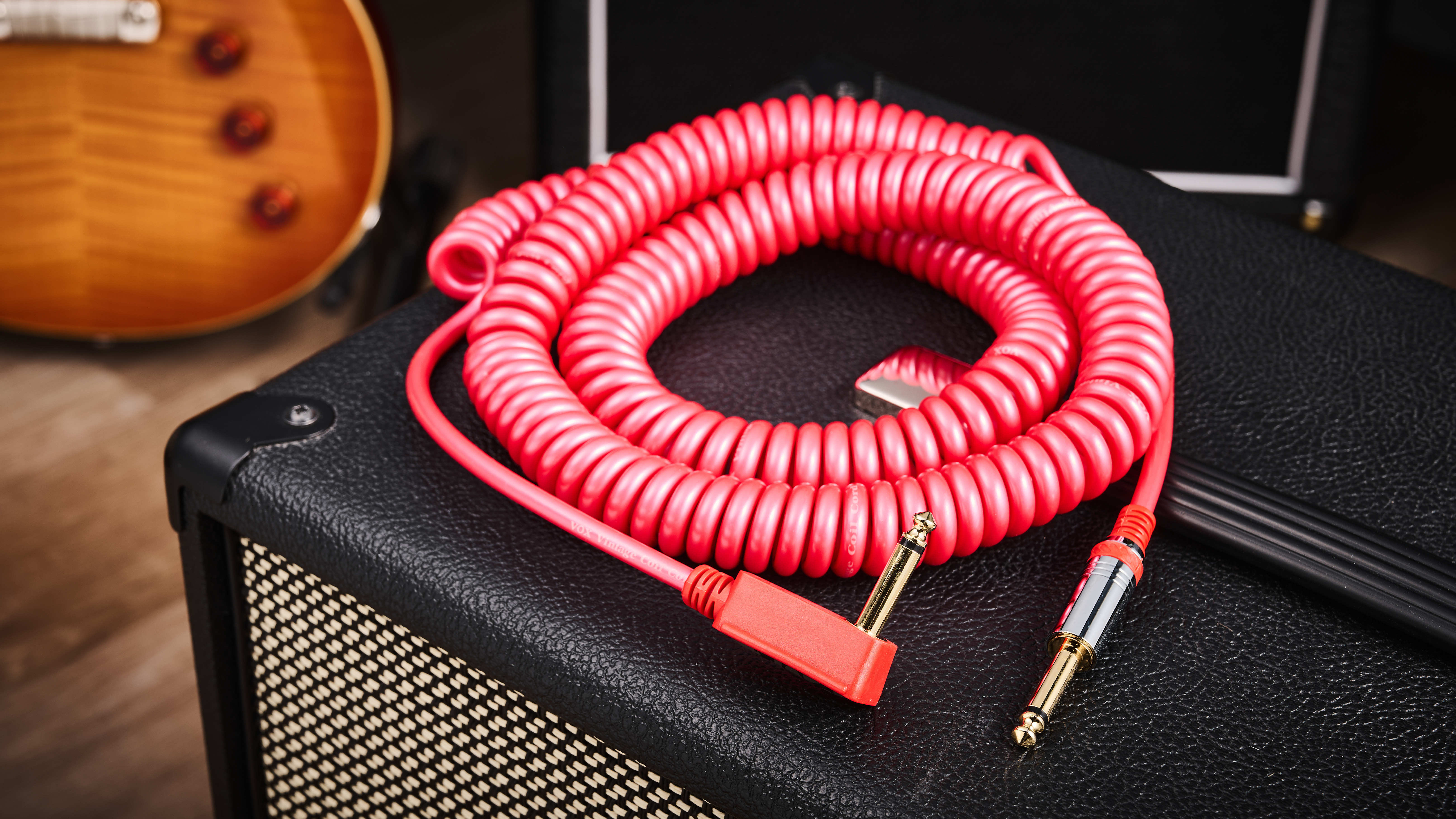
4. Vox Premium Vintage Coiled
Our expert review:
Specifications
Reasons to buy
Reasons to avoid
🔌 The Vox Coiled Cable is for the guitarist who wants to evoke a bygone era with their guitar playing. It's not the most user-friendly, but it does look seriously cool on stage.
✅ Buy if you're all about retro cool: This coiled cable is one of the coolest looking in this guide, and gives instant Hendrix vibes when played live on stage. Marshall stack optional.
❌ Avoid if you don't like a heavy cable: Those coils make this a considerably weightier cable than the others in this test, so avoid if you don't want your cable pulling down a little on your guitar.
Overview: The Vox Premium Vintage Coiled is the only coiled cable in this group test, which makes sense as this type of cable isn’t the most popular choice. Some guitarists prefer the way it springs back up, which stops it getting in your way on stage, others just like the vintage aesthetic the coiled cable implies, and particularly its association with Jimi Hendrix.
Options: The Vox coiled cable comes in four different colors, with red, white, blue, and black all available. It’s the longest cable in the group test at 29.5ft, but that’s the only length that you can get it in. When fully coiled together it measures around 4.5ft, so there’s a lot of flexibility available with this cable.
Build quality: The first thing I noticed about this coiled cable is that it’s really heavy compared to the others. There’s a lot of material here with it being coiled and that translates to a heavier weight than similar length cables. The thick plastic connector on the right-angle end might also account for some of that.
As it’s coiled, it doesn’t flex in quite the same way as the others in this test, but giving the straight portions of the cable near the connectors a bend, it doesn’t feel a million miles away from the others. Once you start stretching out the coils they tend to stay a bit stretched out rather than just instantly returning to their original position. Over time though, they eventually return to a position closer to where they began.
As far as I could tell you can only screw one end of the cable to look at the soldering beneath, as the right angle connector is housed in a plastic casing with the Vox logo on it. Unscrewing at the other end, I had a look at the soldering join, which is encased in some kind of hard plastic. Good for keeping things in place, but probably less ideal if the cable ever ends up needing a repair.
From what I could see through the clear plastic, the interior cabling has been neatly soldered into place. It means that portion of the cable is unable to flex at all, so when covered by the metal sheath of the connector, it should be well protected. Instead of a long PVC-type cover extending beyond the connector and down the cable like most of the others have, the Vox coiled cable cable has a flexible plastic casing that protects the cable near the connector from any excessive flex.
Verdict: I think the Vox Premium Vintage Coiled Cable is really well made, but it will prove divisive amongst guitarists due to its design. I’m sure some will love the coiled cable aesthetic and its ability to not get in your way when you’re playing, but for the others, the additional weight might prove to be a pain.
Test | Results | Score |
|---|---|---|
Options | Some very cool colours but only one length | ★★★★☆ |
Build quality | Feels very solid, but it is heavy for a cable | ★★★★☆ |
Connector | Solid, but one end is inaccessible | ★★★★☆ |
Flexibility | Very flexible, but doesn't retain shape over time | ★★★★☆ |
Overall | Great if you want that vintage look | ★★★★☆ |
Best for live playing
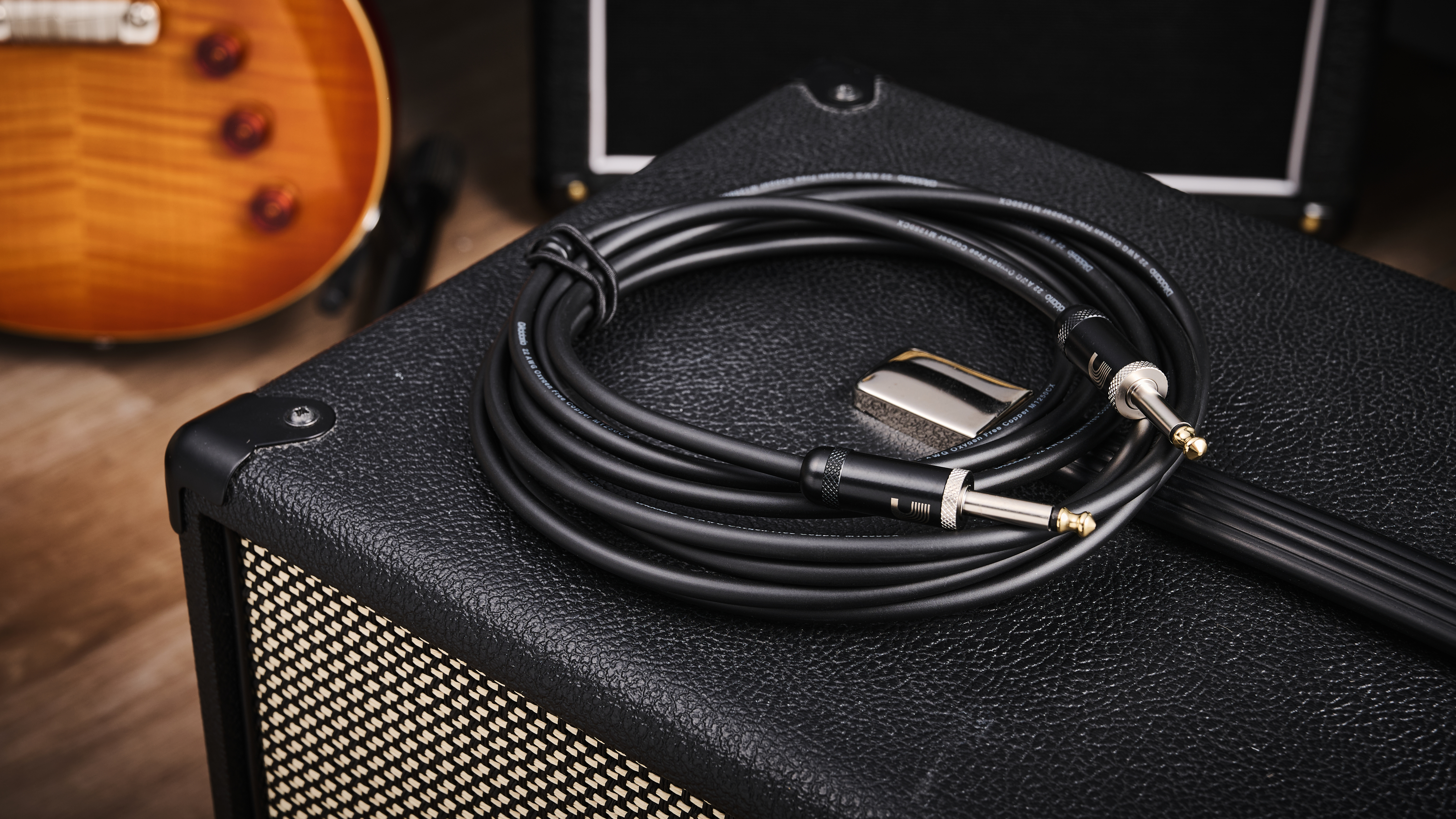
5. D’Addario American Stage
Our expert review:
Specifications
Reasons to buy
Reasons to avoid
🔌 The D’Addario American Stage is for the regularly gigging guitarist who needs the complete freedom of the stage. Coming in a huge 30-foot option, this is one cable that won't leave you tied to your pedalboard.
✅ Buy if you want a great cable for gigging: It's incredibly robust build and excellent long length options make this a great cable for the regularly gigging guitar player.
❌ Avoid if you're on a budget: Good quality comes with a price, so if you're on a tight budget you're better off elsewhere.
Overview: The D’Addario American Stage cable instantly makes its best use case clear in its name. With a super durable build and one of the strongest solder joints I came across in this group test, it’s a cable designed for the rough and tumble of going on tour, and there’s a lifetime warranty to back its impressive manufacturing up.
Options: This cable is available in four different lengths, and you can also get three different configurations of connector, which separates it from a lot of others. With a straight-to-straight, right angle to straight, and right angle to right angle option, it’s one of the most versatile guitar cables available in terms of options. That doesn’t stretch to colors though, as it’s only available in one color and one color only - black.
Build quality: The jacket of this cable is the nicest feeling out of all the cables I tested, with a smooth yet robust feel. It gives it a very premium quality, much like that of the Mogami cable, and definitely feels up to the task of performing on stage. It’s reasonably lightweight, and I really like the elasticated string wrap that comes with it, which I prefer to the velcro ones that typically come with guitar cables.
It’s pretty flexible too, which is another plus point for me. It’s one of the bendiest out of all the cables I tried out, but not so much that it feels cheap or poor quality. It means that it’ll be a good performer in a variety of situations and able to be routed more easily than those cables that are profiled a little stiffer.
The American Stage cable features Neutrik connectors, although they’re not branded as such. D’Addario has spec’d its own ‘Geo-Tip’ which is a different colour to the rest of the connector, and claims to provide a better connection with a variety of jacks, although it didn’t sound any different to any other cable to me.
Unscrewing the plug jacket and removing the plastic cover, I got to see the outer portion of the ‘Helio-Fused’ solder connection, where the cable feeds into a metal tube and features a 180-degree soldered connection. It feels absolutely rock solid, and there was zero flexing when I pulled on or tried to bend the cable, giving plenty of reassurance that the connection is not going anywhere.
It doesn’t look very repairable though, much like the Vox coiled cable it appears to be a permanent solution but with a lifetime warranty, should you ever need to repair it, you should be able to go back to D’Addario and get a new one.
Verdict: All in all, I can highly recommend the D’Addario American Stage for any use, but with that 30-foot long option, it’s definitely a great shout for those who play live. Sometimes your amp can be miles away from you on bigger stages, so having a decent length cable with robust build quality is a must for regularly gigging players.
Test | Results | Score |
|---|---|---|
Options | Great length options but only one color | ★★★★☆ |
Build quality | Incredibly well built | ★★★★½ |
Connector | Neutrik connectors that you can unscrew for repairs | ★★★★½ |
Flexibility | One of the most flexible I tried | ★★★★½ |
Overall | A great option for gigging guitar players | ★★★★½ |
Best custom cable
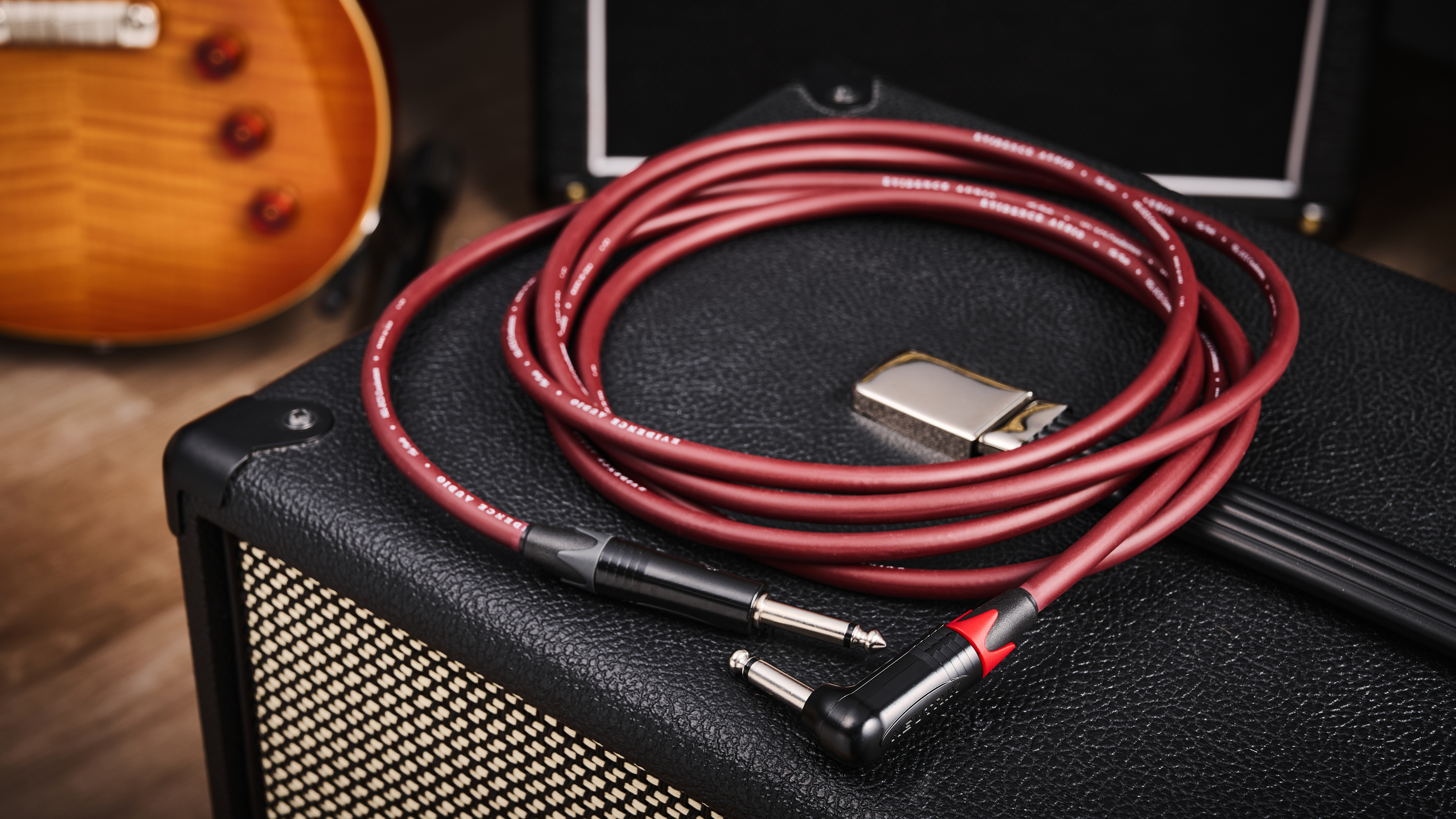
6. Evidence Audio Forte
Our expert review:
Specifications
Reasons to buy
Reasons to avoid
🔌 The Evidence Audio Forte is a cable for guitarists with very specific needs. Featuring a directional cable, and available to be customized to whatever degree you need, this is a premium instrument cable for the discerning guitar player.
✅ Buy if you want something very specific from your cable: Able to be customized to your exact specifications, this guitar cable is one for the picky guitar player who knows exactly what they want.
❌ Avoid if you're on a budget: As you might expect from a custom option, this is not a cheap cable so look elsewhere if you don't want to spend loads.
Overview: If you’re looking for a durable guitar cable that can be spec’d to your specific needs, the Evidence Audio Forte is an awesome option for guitar players. They’re not cheap, but you’re getting a handmade cable with the utmost quality components and a design that prioritizes quality.
Options: As Evidence Audio cables are directional, they come in four different options with straight to straight, angled to straight, straight to angled, and angled to angled. On the website they specify three different lengths, but these can be customized to whatever your desired length is, which is super useful if you don’t want oodles of unnecessary cable running around where you play.
Build quality: The gauge of the cable is one of the thickest out of everything I tested, and that gives it a very premium feel. The core is made from drawn copper, which is why it works best in a particular direction, and while this is a process that gives the copper a more solid core, the cable doesn’t feel any less flexible than any of the others I tested.
It moves nicely under load, without that annoying stiffness you sometimes get on thicker gauge cables that prevents you from manipulating it as you would like. The outer jacket of the cable feels among the strongest out of all the cables I tested, giving me no doubts it’ll put up with plenty of roughhousing out on the road. It gives a good weight, heavier than the Mogami and the D’Addario, but not as weighty as the Vox coiled cable.
Unscrewing the connector, I’m greeted by a more traditional connector join than I encountered with the other cables, with a plastic sheath that covers up the join to prevent it from touching the plug housing. The soldering itself is nice and shiny, and even with me tugging on it, it’s clear it’s going nowhere. It’s not quite as fancy as some of the designs from the other brands, but it certainly feels as robust as the others.
Verdict: If you want a top-quality cable in a particular length not available from other companies, the Evidence Audio Forte is a great option. It’s undoubtedly one of the highest quality cables I tried during this test, and although it is expensive, it’s worth the outlay if you want a cable that’s going to stand the test of time.
Test | Results | Score |
|---|---|---|
Options | Can be customized to whatever specs you like | ★★★★★ |
Build quality | Well built, with a particularly robust jacket | ★★★★½ |
Connector | Screwable Neutrik jacks are rock solid | ★★★★½ |
Flexibility | Good flexibility considering the thick gauge | ★★★★½ |
Overall | One of the very specific type of guitar player | ★★★★½ |
Spec comparison
If you're still struggling to decide which cable to go for, I've put their key specifications side by side here for you. Looking at each component of the cables as well as the various options, my spec comparison will give you a nice overview.
Model | Connector | Jacket | Connector options | Length options | Color options |
|---|---|---|---|---|---|
Mogami Gold | Neutrik | Carbon-impregnated PVC | 2 | 5 | 1 |
Ernie Ball Braided | Ernie Ball | Braided | 2 | 3 | 12 |
Boss BIC-5 | Gold-plated | Braided | 1 | 4 | 1 |
Vox Premium Vintage Coiled | Gold-plated | PVC | 1 | 1 | 4 |
D’Addario American Stage | Neutrik | PVC | 3 | 4 | 1 |
Evidence Audio Forte | Neutrik | PVC | 4 | 3+ | 1 |
Also consider
For me, the cables I’ve looked at above are where you should be spending your money, but I also appreciate they might not be for everyone. Below you can find some more cables that I tested for this guide if you didn’t find what you were looking for above.
Mogami Overdrive
12-30ft | Neutrik connectors | Straight to straight/angle
The Mogami Overdrive cable is a more guitar-specific offering from Mogami that comes with some cool features. It’s very thick in terms of gauge, which makes it slightly inflexible, but it comes with the Neutrik connectors and the same rock solid build quality as the Mogami Gold. It also features a ‘silent connector’ which has a small metal ring that keeps the cable disengaged until you plug it all the way in.
★★★★½
Boss BIC-10A
10ft | 24k gold-plated connector | Straight to angle
Taking a leaf out of the Ernie Ball book, the Boss BIC-10 gives you a nice variety of colors that will definitely pair well with those colorful Boss stompboxes on your ‘board. Available in six different colors, they’re all 10ft in length and come with a straight to right angle configuration. This makes them a little limited in terms of options, but a great shout if you want something different from a standard black guitar cable.
★★★★½
Ernie Ball Flex Cable
10-20ft | Compact connector | Straight to straight/angle
If you want a cheaper cable in lots of color options but don’t fancy a braided cable, the Ernie Ball Flex Cable is a great option with a more traditional build. It’s much more flexible than the braided cable, and still comes in a huge variety of color options for those who want a bit more personality in their cabling.
★★★★½
GLS Audio Tweed
6-20ft | Nickel connector | Straight to straight/angle
With it’s double shielding and low capacitance, the GLS Audio Tweed is a great quality guitar cable. It’s on the pricier end of the scale, but that means you get excellent build that will stand the test of the time. I found it flexes nicely, and definitely stands shoulder to shoulder with the higher quality cables in this guide like the Mogami and Evidence Audio offerings.
★★★★☆
Fender Deluxe Instrument Cable
5-25ft | 24k gold-plated connector | Straight to straight/angle
Although probably not the first name you think of when buying a guitar cable, Fender makes excellent quality cables alongside their guitars and amps. The Fender Deluxe Instrument Cable is a great low cost option with a braided tweed exterior that will perfectly match one of their famous tweed coated amplifiers.
★★★★☆
How to choose the best guitar cable for you
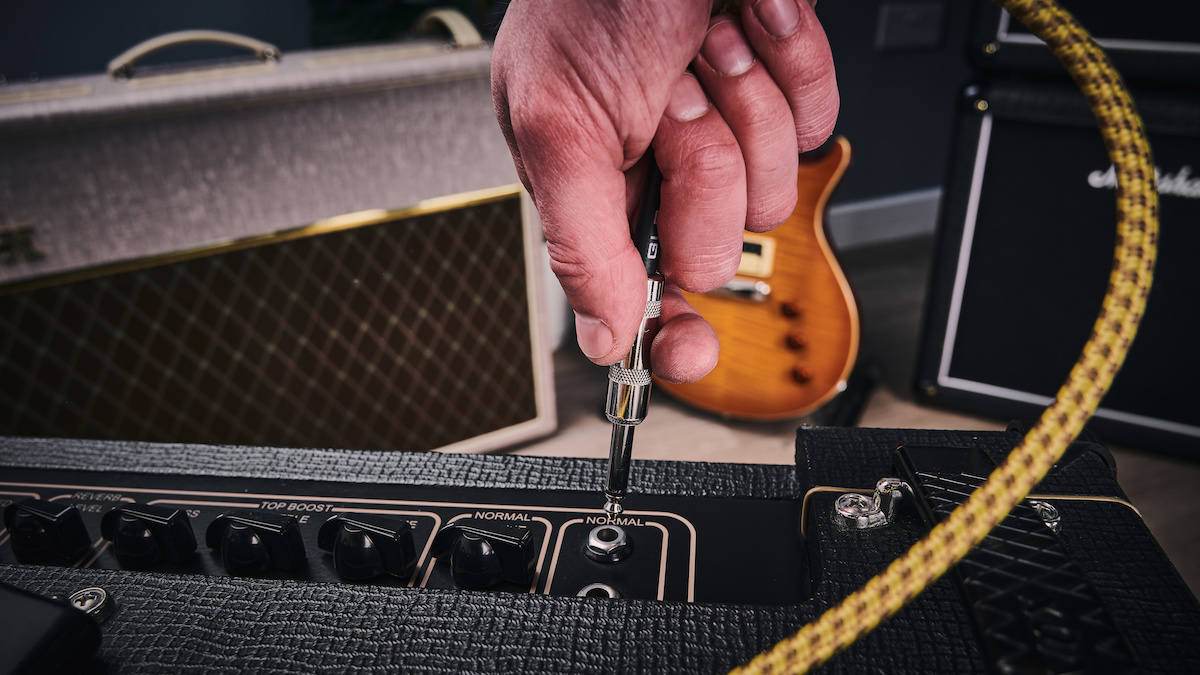
Whether you’ve just bought a new electric guitar or amplifier, or if you’re just looking to upgrade your setup, equipping yourself with one of the best cables should be right at the top of your agenda. If you’re reading this guide, chances are you’re trying to find a superb cable and there are several things you need to consider before buying.
1. What type of cable do you need?
You can trust Guitar World
There are lots of different cables in the cable sections of music stores, but most won’t be needed for guitar-to-amp connection. 99% of guitars will use the same sort of cable – a ¼” jack. There are some outliers, but as a general rule, a ¼” jack cable is what you’re looking for.
Guitar cables are unbalanced, so you don’t need to shell out for a balanced cable; however, if you do end up with a balanced jack for any reason, it should work fine for your guitar – you just won’t see any benefits. An outlier to this is guitars equipped with Taylor’s Expression System 2, which requires a balanced jack - known as a TRS - to work.
2. What length cable do you need?
Cables come in all sorts of lengths, from tiny pedalboard patch cables – still a jack that functions in the same way, but only a few inches long – to 50ft-long monster cables. As a general rule, we would suggest getting the shortest cable that you can comfortably use. If you are gigging regularly, this may be a 20ft cable, and that’s fine, or if you typically play at home in a bedroom, 10ft might be more than adequate.
Longer cables can negatively impact sound quality, so as far as achieving the best tone is concerned, the shorter the better, but always make sure you have enough room to move comfortably, otherwise your cable could be pulled out from either your guitar or amplifier.
3. Are you gigging?
Alongside cable length, if you’re gigging, you’re far more likely to expose your cable to wear and tear, along with other external factors such as moisture, which could lead to corrosion. Some cables are built with durability in mind, such as our number 2, the Ernie Ball Braided guitar cable. If you buy cheap, don’t expect your cable to last too long out on the road, so always have a backup – this is a good suggestion regardless of how tough your ‘main’ cable is.
4. What is your budget?
Cables come in at a huge range of price points, with unbranded cables available for a few bucks, and premium, gold-plated cables coming in at over 10× the price. We would recommend going for super-expensive luxury cables if you’re a professional or do a lot of recording and want the very highest audio signal quality; otherwise, a durable cable from a reputable brand such as D’Addario or Ernie Ball will be ideal.
If you’re thinking of going for a budget option, consider that the cheapest cables may not work out as cost-effective in the long run, as these are far more likely to break than more durable cables, which will cost more initially but last much longer.
FAQs
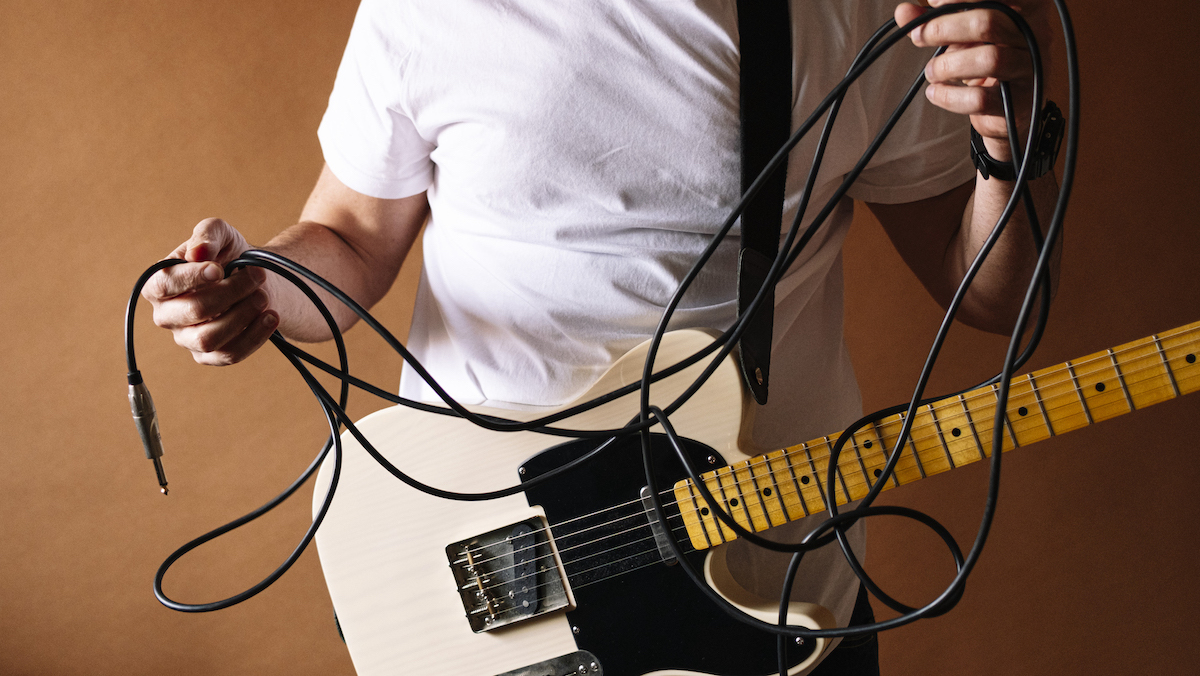
Do I need a different cable for acoustic, electric, or bass guitar?
Generally, acoustic, electric, and bass will all use the same cable, so if you’re a multi-instrumentalist, one cable should suffice – though I'd always recommend having spares! Some specific electric-acoustic preamps and electric guitars with active pickups use balanced cables as opposed to traditional jack cables so will need a specific cable, but these are not common.
Does guitar cable length affect sound quality?
Yes, the length of a guitar cable can impact your sound, the longer the cable, the more capacitance you will introduce. Additional capacitance can alter your sound, but the sound difference between a 10ft cable and a 15ft cable will be fairly negligible. The longer your cable, the more you will notice the impact.
Are guitar cables universal?
Almost all guitars will use the same 1/4-inch jack cable. The 1/4-inch refers to the jack plug at the end of the cable, which should fit both your guitar, amplifier, most guitar pedals, audio interfaces, and pretty much any device designed for guitar. Although I’d stop short of saying that cables are universal, as there are some anomalies out there, for the most part a guitar cable will work with most audio gear designed to take a 1/4-inch plug.
What is cable capacitance?
Capacitance is the ability of a guitar cable to store electrical energy. In guitar terms, it’s all about the loss of high-end frequencies. The higher the capacitance of a cable, the more you’ll lose the top end of your tone. With a guitar cable, you want a low capacitance in order to ensure all of the frequencies reach their intended destination.
Are guitar cables balanced?
Guitars cables are unbalanced as a guitar is incapable of sending a balanced signal. You can use a balanced cable with a guitar, but it won’t give you any benefits. The difference between balanced and unbalanced cables is that an unbalanced cable has a single conductor wire and a ground wire, whereas a balanced cable has two conductor wires and a ground wire. Also known as a TRS cable, the extra conductor in a balanced cable reduces noise, and can be used for stereo guitar pedals, expression pedals, MIDI controllers, studio monitors, and other studio gear like XLR cables.
What are guitar cables made of?
A guitar cable can be broken down into 4 key components. A conductive core, typically made of copper. Lavish metals such as gold can be used in premium cables, which are super conductive and theoretically give you a better signal, though in reality this is minimal. These will be connected at either end to a plug, which connects the cable to your guitar and amplifier. Insulation is added that surrounds your conductive core and stops the electrical signal passing through the conductor from interacting with external audio signals or people. Around this will be the jacket, which protects everything from external factors and may also have a distinctive look.
Can guitar cables cause buzz?
A poor or damaged cable can certainly result in buzz. If a connection is loose between the plug and cable, you may notice some buzz, though this may be fixed with some soldering. If the core of the cable itself is broken, this is less easy to fix and can be a particularly bad source of hum when the cable is being moved.
Cheap cables may have less effective shielding, which doesn’t stop outside interference from external electrical signals. Stages are typically loaded with lots of these kinds of signals that can play havoc with cables, so decent shielding is a must.
Are high-end guitar cables worth it?
Throughout your guitar rig, cables are perhaps the place where you will notice the difference between budget and high-end the least particularly initially. Many of the individual things that make a high-end guitar cable worth it are the multitude of small improvements. One area where a high-end cable will almost always be superior is longevity, so a higher initial cost may end up being better value for money over time.
Do gold-plated cables make a difference?
Yes, they can make a difference. Gold is a superior conductor to copper and has less capacitance, which would result in clearer audio signals with the high end left intact. However, a lot of cables are nickel coated in gold, which arguably adds an additional layer that can affect the tone. The reality is that it’s a very minimal difference that the majority of players wouldn’t notice, however, if you have a high end guitar, with a high end amp, why not have the best cable in between them?
Key terms
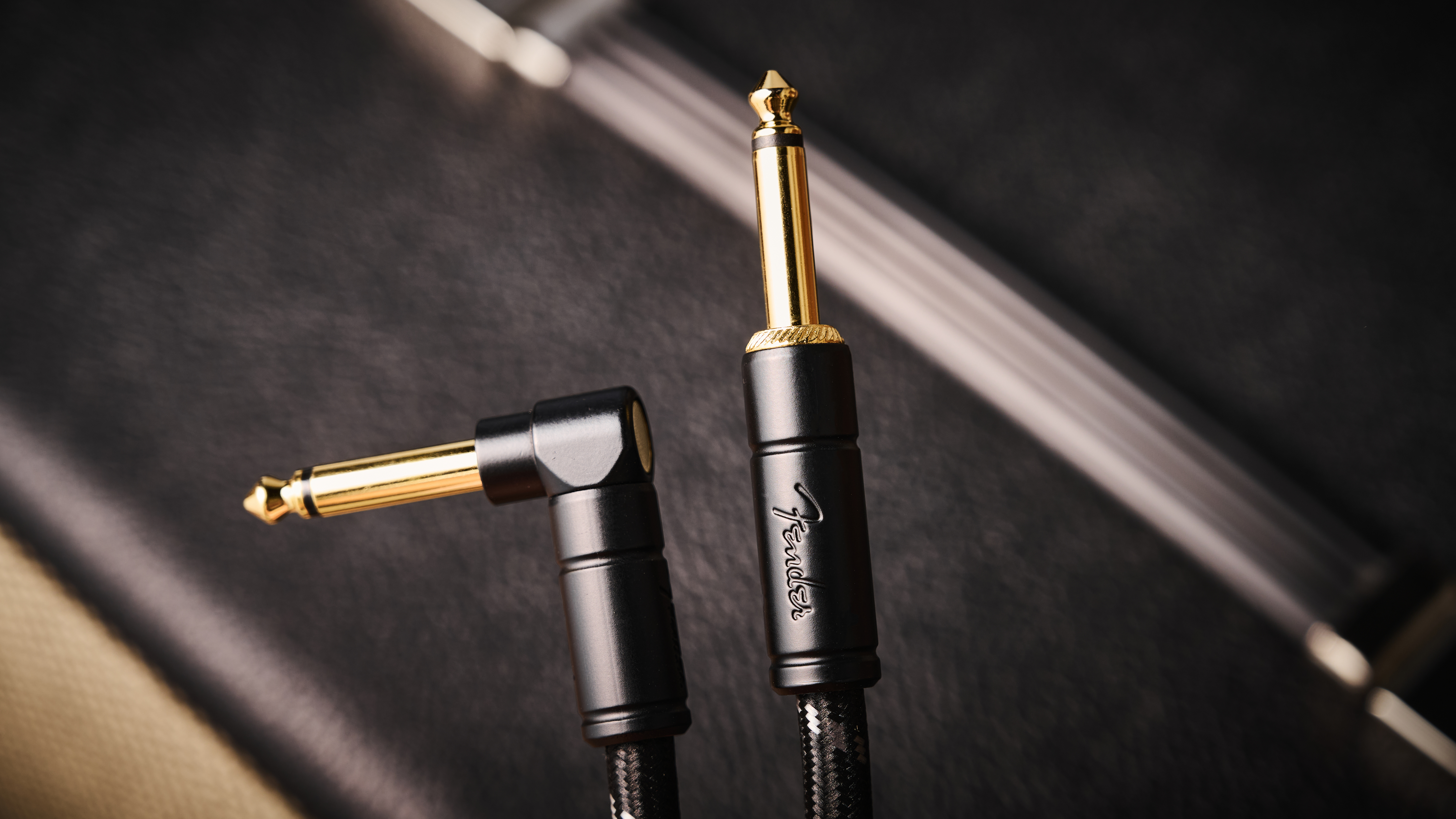
If you’re struggling to decode the lingo used when discussing guitar cables, my glossary of key terms will get you pointing in the right direction. Here you’ll find all the commonly used language associated with guitar cables and succinct definitions of what they mean.
- Balanced - Refers to the kind of signal that is sent through two within one (TRS) cable that carry the same signal but with opposite polarity, cancelling out noise and interference. These are generally used more in the world of pro audio or in the studio. Very few guitars will require a balanced cable as the signal a guitar produces is not balanced.
- Capacitance - The ability to store electrical charge. Longer cables or cables with higher capacitance can act as a low-pass filter, attenuating high-frequency (treble) signals as it holds on/stores your signal.
- Conductor - The central material of a cable that carries the signal. Often made of copper, the conductor will typically be made of many strands of the conductive metal, which allows it to bend much easier.
- Gauge - The thickness of the conductor. A thicker gauge of cable – measured in AWG (American Wire Gauge), where the lower the number, the thicker the gauge – should result in a more robust audio signal path.
- Impedance - Is a type of resistance found in a guitar cable which relates to the flow of electrical currents. The higher the impedance, the higher it resists the flow of your guitar current, which can relate in signal loss, particularly the high end.
- Insulation - The layer that surrounds the conductive core of your cable. The insulation will be a non-conductive material that stops the guitar signal interacting with other electrical signals and shorting out. It also offers the user protection from electrical shocks.
- Jacket - The outer layer of your cable, protecting the conductive core and shielding that surround it. The jacket offers protection from outside elements such as abrasion, moisture, and dirt.
- Oxygen-Free Copper (OFC) - Copper produced in a controlled, low-oxygen environment resulting in a purer product that offers better conductivity and results in a cleaner audio signal path.
- Plug - The ¼” connector at either end of your jack cable that is inserted – or ‘plugged’ – into your guitar/amp.
- Shielding - The material used in cable construction to stop external electrical interference into your audio signal, which can create noise.
- TRS (Tip-Ring-Sleeve) - The name given to balanced audio cables, which are designed with a tip, ring, and sleeve. These cables can transmit stereo signals and balanced, mono signals, neither of which guitars produce, though many pedals, synthesizers, and pro-audio equipment use these types of cable. The tip (T) carries the main audio signal, the ring (R) can carry a second audio signal or be used as the negative signal in a balanced connection, and the sleeve (S) acts as the ground.
- TS (Tip-Sleeve) - The name given to unbalanced cables. The tip (T) carries the single, mono signal, with the sleeve (S) acting as ground. This is the type of cable your guitar will use.
- Unbalanced - A signal that is not balanced uses a single conductor for the audio signal and a ground wire and is (generally) the signal used from guitars to amplifiers. It can suffer from noise caused by electrical interference.
How to look after your guitar cables
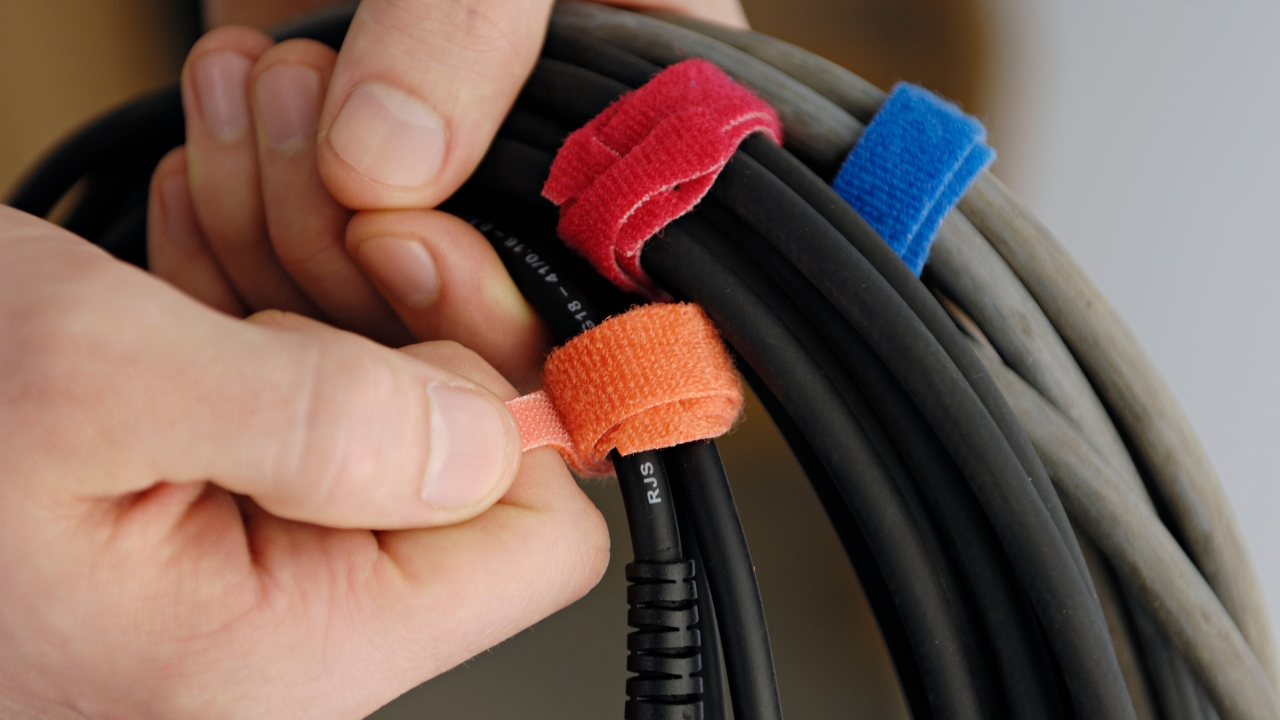
Taking good care of your cables is really important too – there’s no point spending a load of money on the best guitar cables, just to then treat them badly. Coil them properly when they’re not in use, and try to be wary of standing on them (not always easy when playing on small stages). Things like making sure your amp or pedalboard isn’t trapping them might seem an obvious step to take, but this has certainly led to the demise of many cables over time!
Here are some top tips from me that will ensure your cables stand the test of time:
1. Pull the plug
I mean this quite literally. Always pull from the plug itself and not the cable. Inside your guitar cable plug your cable is soldered to a connector, so pulling on the actual cable can weaken this joint and cause a failure.
2. Loop your cable
If you've ever watched pro guitarists play live, you might see they've looped their cable through their straps. It's not only a great way to prevent you from tripping on your cable, but also helps it last longer as you won't be treading on it whilst it's still plugged in, causing pressure on the connector. Another top tip is to loop the opposite end through the handle of your amp to prevent it from being pulled out accidentally.
3. Don't tread on me
If you can, try not to step on your guitar cables. When you're setting up, it's good to get in the practice of getting your amp, pedalboard, and guitar in the right place before you start plugging anything in.
4. The right angle
Right angled cables are really good for certain scenarios where you don't want loads of pressure on your cable. Think if your amp has its input jack on the top, a right angle cable will take a lot of the pressure off. Similarly, a right angle cable in your pedalboard can put any fears of someone treading on a cable to rest.
5. It's a wrap
Learning how to properly wrap your cables is a simple-to-learn skill that will stay with you forever, and ensure your cables accompany you too. Sound and studio engineers will love and respect you, and it helps keep everything organized in your rig. It'll speed up your setup process massively too, so taking the time to do this when you set down is absolutely worth the effort.
We won't go into exactly how to do it here, but here's a simple video that shows you how to do it:
Why trust us?
✅ A global audience of 3.8 million guitarists monthly
✅ 1,200+ reviews on GuitarWorld.com
✅ 30+ years of product testing at Guitar World
Guitar World boasts over 44 years of expertise and stands as the ultimate authority on all things related to guitars. The magazine and website feature expertly written gear round-ups and top-quality, authoritative reviews penned by a team of highly experienced industry professionals.
Guitar World's inaugural print issue hit the shelves in July 1980, and ever since, it has been captivating players and enthusiasts with engaging lessons, insightful interviews with the most prominent guitar heroes, and priceless buying advice for newbie players.
Furthermore, GuitarWorld.com continues this legacy online and serves as the hub of the world's foremost authorities on guitar playing. The site not only hosts content from Guitar World but also showcases articles from respected publications such as Guitarist, Total Guitar, Guitar Techniques, and Bass Player. With a reach extending to 3.8 million players each month, GuitarWorld.com is a go-to destination for guitar fanatics globally.
How I tested
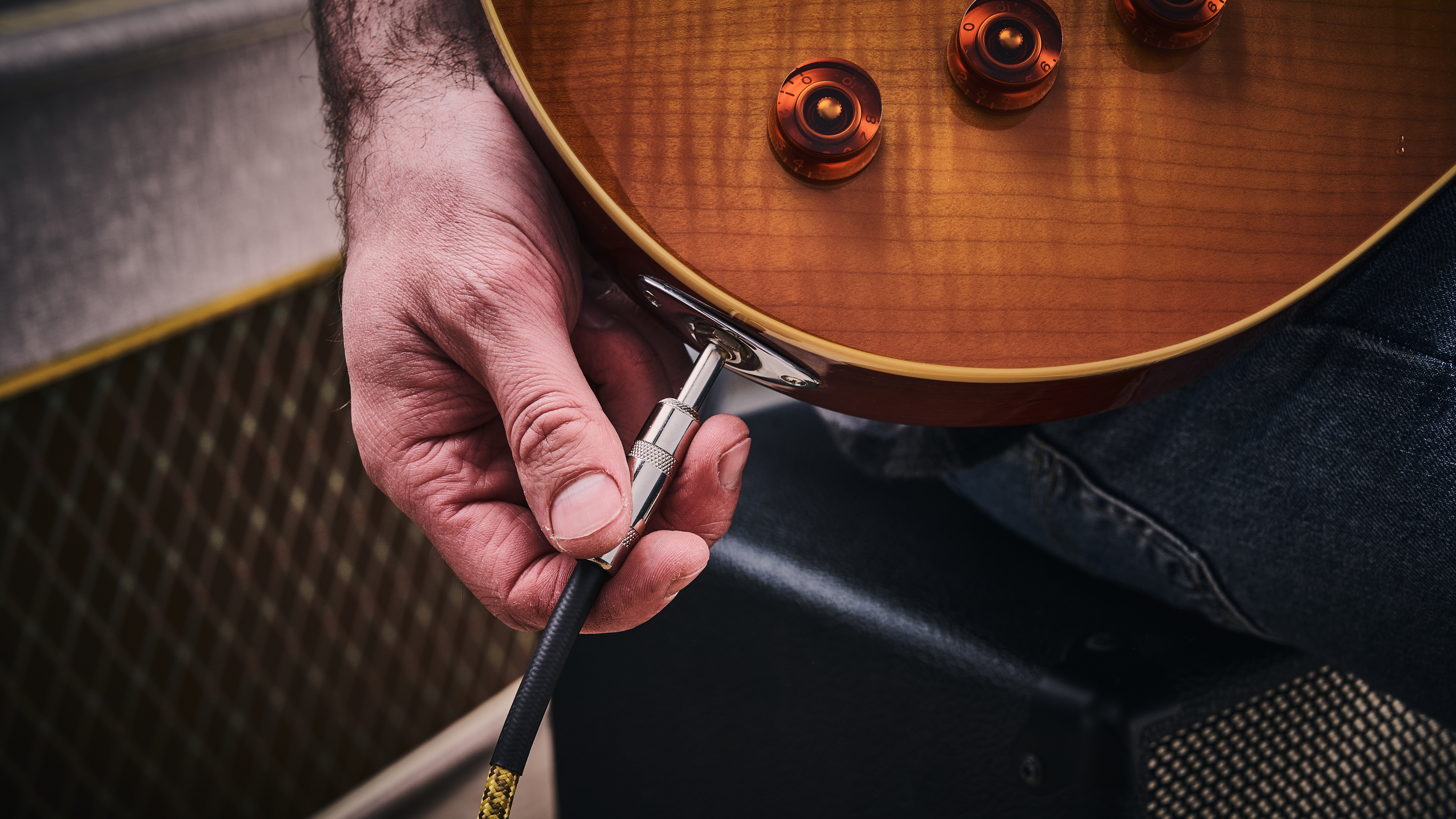
Testing a guitar cable isn’t quite as subjective as something like a guitar or a guitar pedal. At the end of the day, a guitar cable has a simple job, and that’s to pass a clear and noise-free signal from your guitar to your guitar pedal, amplifier, audio interface, or whatever you choose to plug your instrument into. Unlike most of the other components of your signal chain, you shouldn’t actually be able to notice a guitar cable.
As guitar tone is so subjective, I opted not to base my testing primarily on sound. Of course, I plugged every guitar cable in to see that they actually worked. I listened to the DI signals, but could find no particularly audible difference from the different cables I tried. Yes, under a microscope there are some small EQ diferences in the sound from cable to cable, but it’s so negligible that I’m sure most guitarists will be unable to hear the difference in a blind test, and I certainly found it difficult to appreciate the sonic differences.
Instead, I opted to base my testing around the build quality of the cable, and how long I think it’s going to last. This meant taking them apart at the connectors, handling them to see how they flex, stressing the connector ends, and of course just using them in daily life to see how they withstand the pressure of being used.
In my experience the best guitar cables I’ve used are the ones that just do their job reliably, night after night, and that’s far more important than the coating of the connector imparting a slightly improved connectivity.
The other factor I took into account in my testing were the available options. Different guitarists will have different needs, so a great guitar cable needs to account for the differing demands of guitar players. That meant checking out all of the various options available from the manufacturers website, which in some cases might be just a single option, whereas others offered over 30 different cable types.
Ultimately while I may have a preference for what I think is the best guitar cable, for our readers it’s going to come down to this variety of factors as to what they go for. Whether that’s a particular length, type of connector, or just a cool color, the best guitar cable will be different for every guitarist.
Read more about our rating system, how we choose the gear we feature, and exactly how we test each product.
06/01/26: The introduction has been refreshed, offering a more concise breakdown of the guide's contents. A fresh header image has also been added. Each product entry has had its ratings scorecard reviewed, and scores have been added for the cable connectors and flexibility.
18/11/25: Each entry in the guide has been updated with some extra sections. I've added a 'who is it for?' boxout for a quick overview, an 'at a glance' section detailing reasons to buy and a void, and a ratings scorecard to further clarify how I rated the guitar cables during my testing.
04/17/25: This guide has been completely overhauled. I called in a large number of cables to personally test at home and in the practice room. This guide is the result of my findings. The guide also now includes useful how to choose, FAQ and glossary sections so you should be able to find all the information you need on this page to make an informed buying decision.
All the latest guitar news, interviews, lessons, reviews, deals and more, direct to your inbox!

Matt is a Junior Deals Writer here at Guitar World. He regularly tests and reviews music gear with a focus on guitars, amps, pedals, modelers, and pretty much anything else guitar-related. Matt worked in music retail for 5 years at Dawsons Music and Northwest Guitars and has written for various music sites including MusicRadar, Guitar Player, Guitar.com, Ultimate Guitar, and Thomann’s t.blog. A regularly gigging guitarist with over 20 years of experience playing live and writing and recording in bands, he's performed everything from jazz to djent, gigging all over the country in more dingy venues than you can shake a drop-tuned guitar at. When not writing articles for Guitar World, you'll find him making a racket with northern noise punks Never Better.
